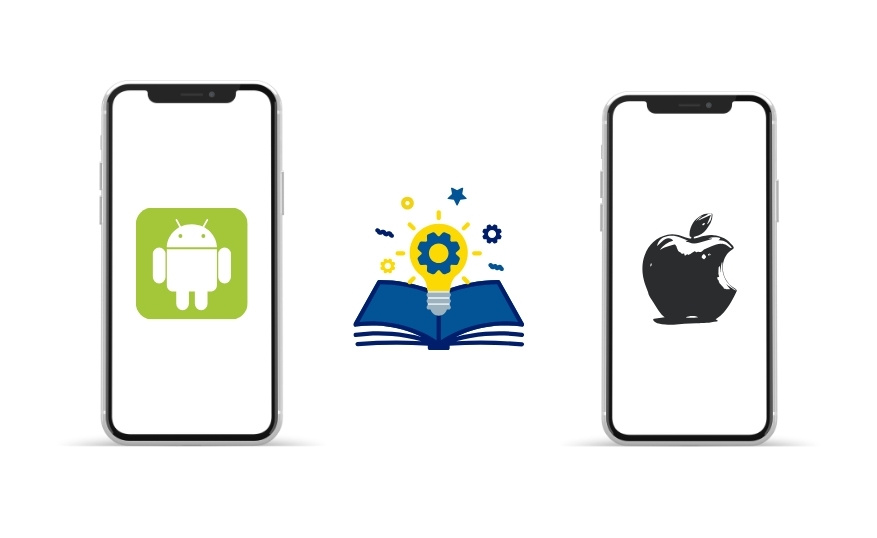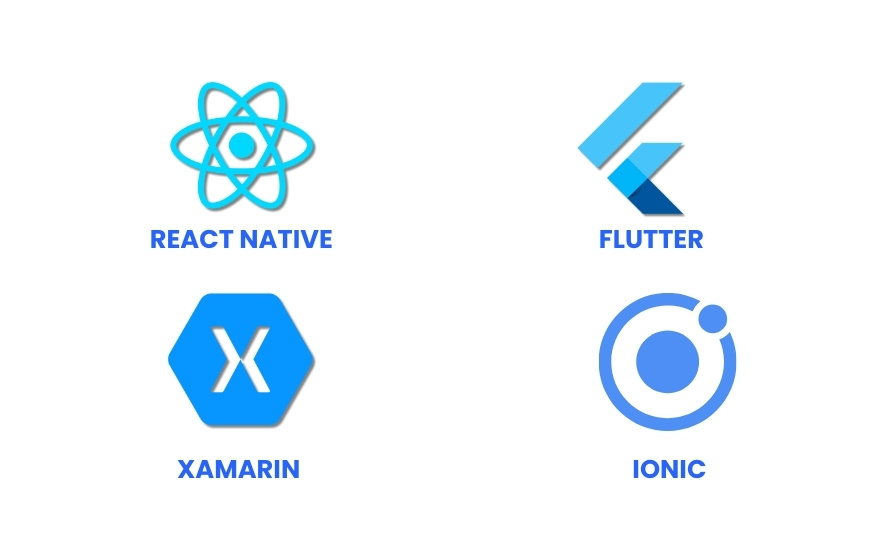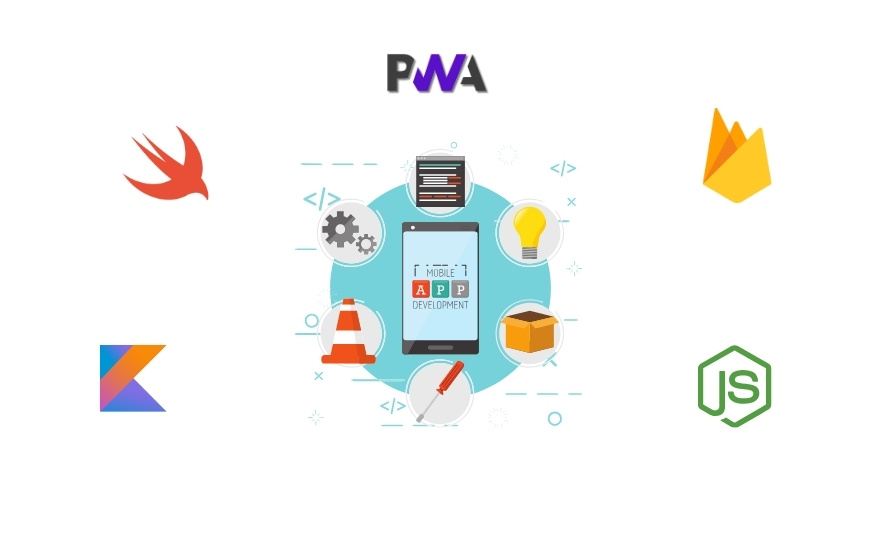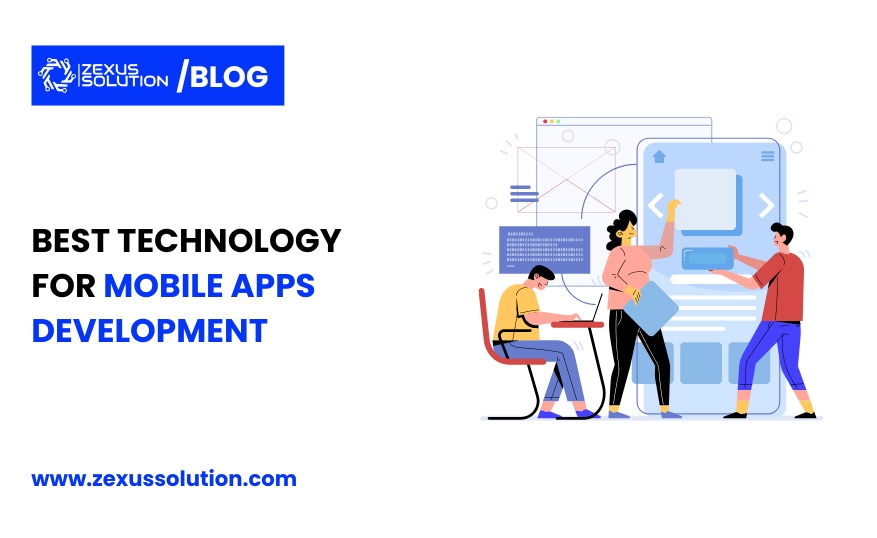Table of Contents
Have you ever wondered why cell phones are such a necessity these days and not a luxury anymore? Your heart starts to skip a beat when you think you have lost it. Our smartphones are filled with mobile applications for every activity of our daily routine like food delivery, cabs, fitness, socializing, banking, shopping, traveling, education, and many more. These days businesses are increasingly turning towards mobile apps to provide more value and enhance customer experience and this is why they search for the best technology for mobile apps.
Imagine your app competes with 3.49 million apps in the Google Play Store and 2.23 million apps in the Apple App Store. It will only attract customers if it has an appealing, user-friendly UI, speed, high performance, chat support, and several other factors. Therefore, it is important to understand and choose the best technology for mobile apps to create a successful mobile app wished by the users.
Due to the growing demand for mobile apps in the market, there has been a sudden increase in best technology for mobile apps and tools. From hybrid to native app development, and from cross-platform development to AI and blockchain, mobile apps and software-related technologies are rapidly increasing. In this blog, you will explore different best technologies for mobile apps, focusing on their strengths, weaknesses, and suitability for several types of projects.
Understanding Mobile App Development Technologies

When starting a mobile application development journey, developers mostly face the issue of selecting between native, cross-platform, or hybrid approaches. Each approach has its advantages and considerations, depending on factors like project needs, budget, timeline, and target audience.
Native Mobile Application Development
Native mobile application development includes building apps specifically for a single platform using the platform’s native language (Java/Kotlin for Android, Swift/Objective-C for iOS). This approach provides the best performance, seamless integration with device features, and a good user experience tailored to the platform’s standards.
Android Application Development
Android Application Development utilizes Java or Kotlin as its primary language. Kotlin, being a more modern and concise language, has gained popularity among Android developers for its enhanced productivity and compatibility with existing Java codebases.
iOS Application Development
It mainly employs Swift, a powerful and intuitive programming language developed by Apple. Swift is known for its safety, speed, and modern syntax, making it a preferred choice for building iOS applications.
Cross-Platform Mobile App Development

Cross-platform development technologies like React Native, Flutter, Ionic, and Xamarin have gained popularity due to their ability to write code once and deploy it across several platforms. This approach greatly reduces development time and costs while maintaining near-native performance and overall user experience.
React Native
It is the most famous cross-platform mobile app development technology used worldwide, This javascript-based open-source framework is developed by Facebook with top-in-class library of pre-built components. Android and iOS apps can be built with a native-like look, feel, and function using a single codebase, removing the need for different teams to maintain separate codes. Thus, it allows the development of platform-specific app versions with ease and saves effort, time, and money.
Flutter
Flutter is developed by Google and is one of the fastest-growing cross-platform mobile app technology. It is an open-source software development kit that uses Google’s in-house language, Dart. Its single codebase allows programmers to write code for one time for several platforms, speeding up the development process and saving the cost of hiring.
Flutter apps have smooth execution and high performance just like native because Dart easily complies with native code. Flutter is free to use, has a strong learning curve, and also has developer community support. Popular apps built with Flutter are Google Ads, Xianyu by Alibaba, and more.
Xamarin
Xamarin is an alternative cross-platform application development framework for creating applications for Android and iOS. Because they use the C# programming language, the applications need fewer lines of code. As a result, the coding process is quicker. Also, it allows for rapid transfer of the scripts across other systems, such as Windows and macOS. Xamarin has been acquired by Microsoft. Developing an app is so much faster these days, you may know that quicker development means sacrificing quality and construction.
However, Xamarin-based apps convey flawless native functionality about quality and efficiency. As a result, its connection with Microsoft Visual Studio is a plus in terms of the management of app development and productivity
Ionic
Ionic is an open-source mobile UI tool kit that was released in 2013. It assists developers build cross-platform mobile applications from a single codebase using various web technologies like HTML, CSS, and JavaScript, with integrations for the Angular, React, and Vue frameworks. It is based on a SaaS UI framework prepared specifically for mobile OS and provides multiple UI components for building applications.
It has its command-line interface known as Ionic CLI, which acts as the go-to tool for building iconic applications.
Hybrid Mobile Application Development
Hybrid mobile application development combines web technologies like HTML, CSS, and JavaScript within a native container, offering a balance between native and web app functionalities. Frameworks like Ionic and PhoneGap/Cordova facilitate hybrid app development by enabling access to device features through plugins while maintaining a single codebase.
Additional Best Technology for Mobile App

1. SwiftUI
SwiftUI is a modern UI framework introduced by Apple for building declarative user interfaces across all Apple platforms, including iOS, macOS, watchOS, and tvOS. It uses Swift and provides a more intuitive and efficient way to design user interfaces compared to traditional UIKit.
2. Kotlin Multiplatform
Kotlin Multiplatform is an emerging technology that allows sharing of code between different platforms, including Android, iOS, and backend systems. It leverages Kotlin’s interoperability with Java and Swift/Objective-C, enabling developers to reuse business logic and data models across platforms while still providing native user experiences.
3. Firebase
Firebase is a comprehensive mobile and web application development platform provided by Google. It offers a suite of services including real-time databases, authentication, hosting, cloud storage, and more. Firebase facilitates rapid development by providing backend services and SDKs that integrate seamlessly with both iOS and Android apps.
4. Node.js for Backend Development
While not directly a mobile app development technology, Node.js is widely used for the backend development of mobile apps. It allows developers to build scalable and lightweight server-side applications using JavaScript. Node.js is particularly popular for building APIs that mobile apps can interact with, facilitating real-time updates and synchronization.
5. Progressive Web Apps (PWAs)
Progressive Web Apps (PWAs) are web applications that leverage modern web technologies to deliver app-like experiences to users. They are responsive, installable, and can work offline. PWAs are cross-platform by nature and can be accessed through web browsers on various devices, bridging the gap between web and native apps.
Technology for Custom Mobile App Development

When choosing the best technology for custom mobile app development, several factors should be considered:
Performance:
Native apps typically offer the best performance due to their direct access to device-specific features and hardware acceleration.
User Experience:
Native apps provide a seamless and intuitive user experience consistent with the platform’s design guidelines.
Development Time and Cost:
Cross-platform and hybrid approaches often reduce development time and costs by allowing code reuse across multiple platforms.
Maintenance:
Native apps may require separate maintenance for each platform, whereas cross-platform and hybrid apps benefit from shared codebases.
Conclusion
In the end, the best technology for mobile app development depends on project-specific requirements and goals. For high-performance apps. For high-performance apps demanding platform-specific features and superior user experience, native development remains unmatched. However, cross-platforms such as React Native and Flutter offer great advantages if you want faster time to market, and need code reusability across platforms.
Understanding these technologies’ strengths and weaknesses enables businesses and developers to make decisions aligned with project requirements, each approach brings unique benefits to the table, catering to diverse mobile app requirements in today’s advanced digital landscape. By leveraging the right technology stack, businesses can deliver impactful mobile experiences that resonate with users and drive business growth.



Add a Comment